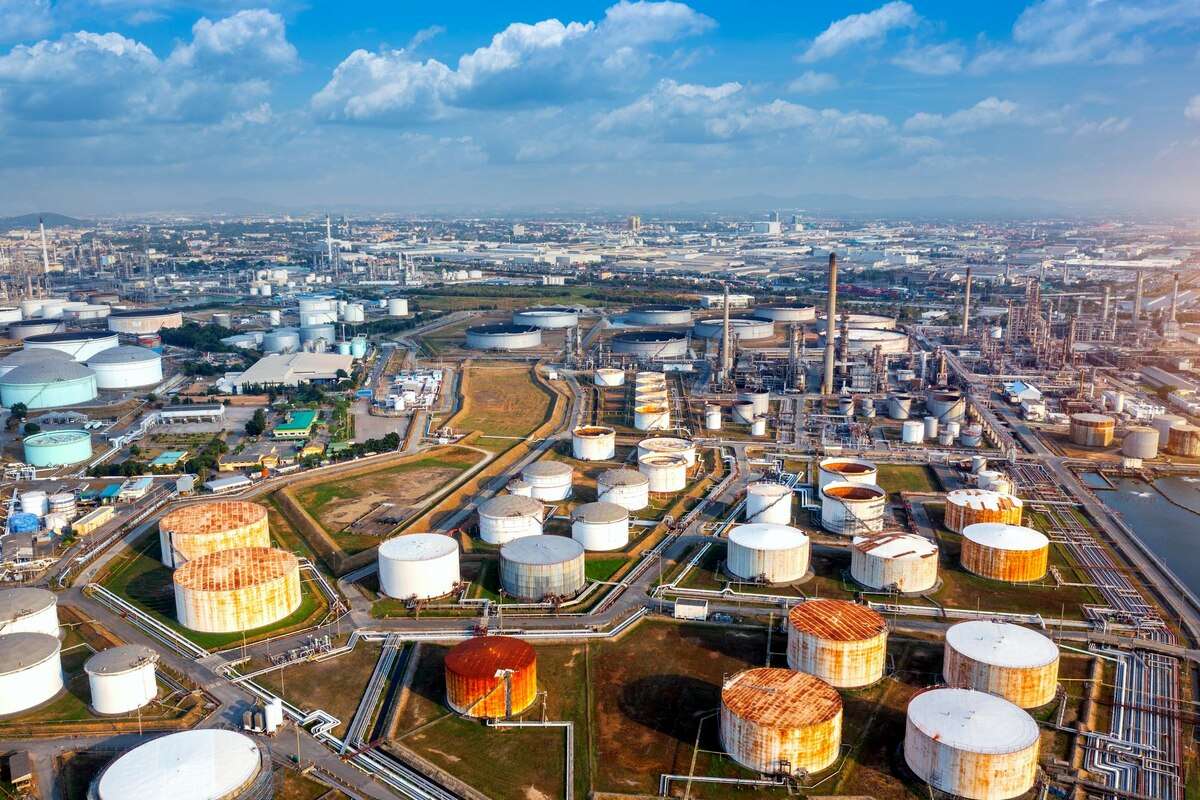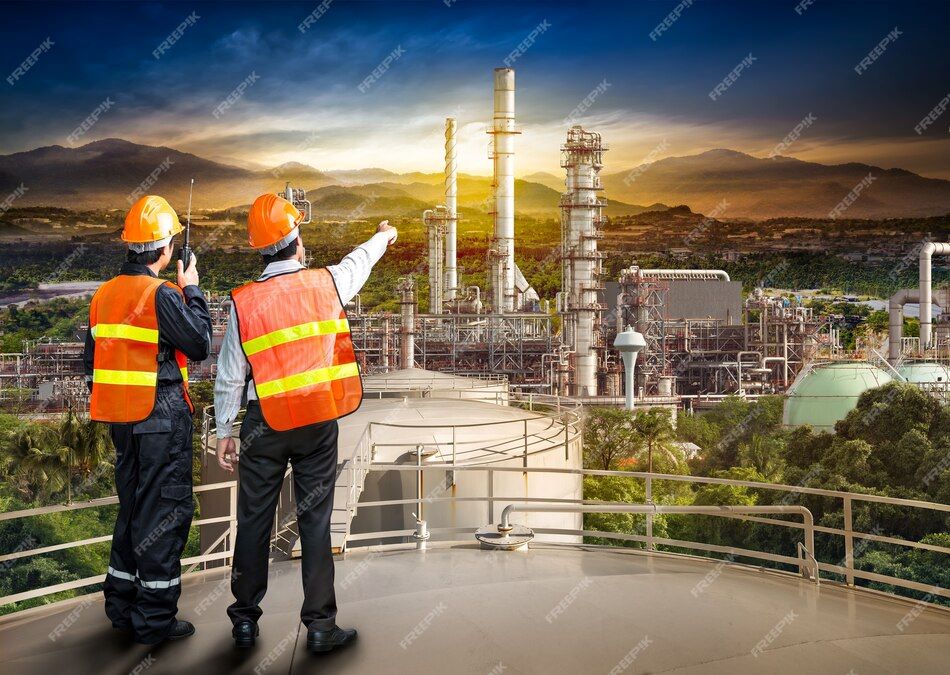 Oil and gas refineries are titans at the center of the world’s energy infrastructure, turning raw hydrocarbons into a wide range of necessary goods that drive economies and society. Within this vast business, a few refineries have stood out as leaders, exemplifying quality with state-of-the-art equipment, environmentally friendly operations, and a steadfast dedication to safety. We explore the many facets of the top oil and gas refineries in this thorough analysis, revealing the subtleties that set them apart in a constantly changing energy market.
Oil and gas refineries are titans at the center of the world’s energy infrastructure, turning raw hydrocarbons into a wide range of necessary goods that drive economies and society. Within this vast business, a few refineries have stood out as leaders, exemplifying quality with state-of-the-art equipment, environmentally friendly operations, and a steadfast dedication to safety. We explore the many facets of the top oil and gas refineries in this thorough analysis, revealing the subtleties that set them apart in a constantly changing energy market.
Technological Progress:
The greatest oil and gas refineries in the world use state-of-the-art technologies that push the limits of productivity and efficiency. Sophisticated hydrotreating systems, catalytic cracking units, and distillation procedures characterize their operations. Artificial intelligence (AI) and automation work together harmoniously to optimize each step of the refining process and improve yield, quality, and operational accuracy. These refineries also use machine learning algorithms and data analytics for predictive maintenance, which reduces downtime and increases overall operational efficiency. By implementing smart technology, these refineries not only guarantee optimal output but also establish themselves as leaders in the field of industrial digitization.Environmental Stewardship:
The top oil and gas refinery are driving the transition to sustainable practices as environmental awareness gains prominence on a worldwide scale. The use of green technologies, carbon capture and storage (CCS), and the integration of renewable energy sources show their commitment to reducing the carbon footprint. Refining facilities prioritize the preservation of the environment by decreasing emissions, putting in place effective waste management systems, and using less water. Their adoption of circular economy ideas like recycling and repurposing byproducts further demonstrates their dedication to environmentally friendly activities. Through their proactive efforts to harmonize their operations with international climate targets, these refineries are becoming industry leaders in environmental stewardship.Dependability and Safety:
 The finest oil and gas refineries prioritize safety since they work in a high-risk business. Strict safety procedures, extensive training programs, and the use of cutting-edge safety technologies ensure the safety of employees and the integrity of operations. Every aspect of refinery operations has a strong safety culture thanks to tools like ongoing risk assessments, real-time monitoring systems, and preventative maintenance schedules.
Another essential component of these refineries is reliability. Stringent maintenance procedures, redundancy in crucial systems, and adherence to international safety standards facilitate uninterrupted and secure operations. These refineries position themselves as strongholds of operational reliability by making investments in cutting-edge technologies and placing a high priority on safety culture.
The finest oil and gas refineries prioritize safety since they work in a high-risk business. Strict safety procedures, extensive training programs, and the use of cutting-edge safety technologies ensure the safety of employees and the integrity of operations. Every aspect of refinery operations has a strong safety culture thanks to tools like ongoing risk assessments, real-time monitoring systems, and preventative maintenance schedules.
Another essential component of these refineries is reliability. Stringent maintenance procedures, redundancy in crucial systems, and adherence to international safety standards facilitate uninterrupted and secure operations. These refineries position themselves as strongholds of operational reliability by making investments in cutting-edge technologies and placing a high priority on safety culture.
Thruput and Capacity:
The top oil and gas refinery have outstanding capacities and throughput capabilities, making them a crucial metric of efficiency. Their capacity to refine massive amounts of crude oil with unmatched efficiency is a result of ongoing enhancements, expansions, and debottlenecking programs. These refineries’ advantageous locations—many of which are close to important markets and hubs for transportation—improve their capacity to supply the rising demand for refined products worldwide. By utilizing advancements in process engineering and optimization, these refineries can maintain product quality at high throughput levels. Their significant contributions to the global energy supply chain place them in a crucial position to guarantee a steady and dependable fuel supply for consumers and businesses around the globe.Global Impact:
The top gas and oil refineries have a big impact on the world energy scene in addition to their physical footprint. Their capacity to manufacture a wide variety of refined goods, such as jet fuel, gasoline, diesel, and petrochemicals, places them in a key role in determining global trade dynamics and energy policies. These refineries have an impact on diplomatic ties and strategic alliances that transcend national boundaries. Furthermore, the significance of their contribution to the economy cannot be overemphasized. These refineries contribute significantly to the GDPs of the nation and the region, provide jobs, and encourage innovation, all of which promote economic growth. Communities around the refineries benefit economically from their presence, which has a knock-on effect on other facets of society.Adaptability to Market Trends:
 The greatest oil and gas refineries are characterized by their ability to adjust in an era of swift technological breakthroughs and changing consumer tastes. These refineries exhibit an astute awareness of market trends and a flexible response to evolving requirements. Flexible production methods allow them to react quickly to changes in the price of crude oil, new technology, and changing regulatory environments.
In addition, these refineries actively broaden their range of products to cater to the changing demands of the market. Their capacity to adjust to market dynamics places them as robust players in a constantly shifting business landscape, encompassing everything from conventional fuels to high-value petrochemicals and specialty products.
The greatest oil and gas refineries are characterized by their ability to adjust in an era of swift technological breakthroughs and changing consumer tastes. These refineries exhibit an astute awareness of market trends and a flexible response to evolving requirements. Flexible production methods allow them to react quickly to changes in the price of crude oil, new technology, and changing regulatory environments.
In addition, these refineries actively broaden their range of products to cater to the changing demands of the market. Their capacity to adjust to market dynamics places them as robust players in a constantly shifting business landscape, encompassing everything from conventional fuels to high-value petrochemicals and specialty products.
Conclusion
The top oil and gas refineries stand out as shining examples of sustainability, creativity, and dependability in the global energy production landscape. These refineries have a significant impact on the direction of the energy sector through their ground-breaking technological innovations, dedication to environmental stewardship, unrelenting attention to safety, and significant contributions to the global economy. These refineries have the potential to take the lead in guiding the sector toward a future that is more robust, efficient, and sustainable as the globe struggles with the changes brought about by the shifting energy landscapePros and cons of oil and gas refinery industries
Pros:
- Energy Production: By transforming crude oil into a variety of vital products like gasoline, diesel, jet fuel, and petrochemicals, oil and gas refineries are critical to supplying the world’s energy needs.
- Job Creation and Economic Impact: By creating jobs, encouraging innovation, and making a sizable contribution to the GDPs of both the national and local governments, refineries promote economic growth.
- Technological Innovation: Automation, artificial intelligence, and sophisticated distillation methods are just a few of the cutting-edge innovations that refineries are bringing to the energy industry.
- Global Trade and Geopolitical Influence: Top refineries have a positive impact on worldwide energy policies and diplomatic ties, as well as the dynamics of global trade.
- Infrastructure Development: The construction and upkeep of refineries aid in the growth of storage facilities and transportation networks, among other types of infrastructure.
- Product Diversification: Refineries may produce high-value petrochemicals and specialty products in addition to traditional fuels by adjusting their product portfolios to market trends.
Cons:
- Refinery operations: Refinery operations hurt the environment by releasing greenhouse gases, air pollutants, and the possibility of oil spills, which can endanger public health and ecosystems.
- Resource Depletion: Drawback: The extraction and refinement of fossil fuels harm ecosystems and biodiversity by causing resource depletion and environmental degradation.
- Concerns about climate change: Refinery operations release a significant amount of carbon dioxide into the atmosphere, which highlights the need for low-carbon and sustainable alternatives.
- Surroundings: Because refineries handle explosive materials, there are inherent safety hazards. Accidents can have serious repercussions for both staff members and the community surrounding them.
- Dependency on Fossil Fuels: This prevents the switch to cleaner, more sustainable energy sources by sustaining reliance on non-renewable resources.
- Vulnerability to Market Fluctuations: Changes in the price of crude oil, regulatory actions, and market demands may have an impact on refineries’ profitability and long-term survival.



